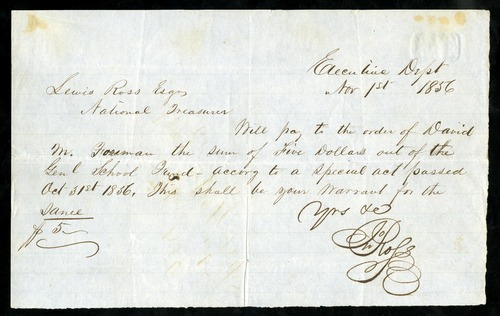
Auction: 321 - The Numismatic Collector's Series Sale and Stocks and Bonds of the Americas
Lot: 813
Ross, John (1790-1866). Also known as Guwisguwi ("Little White Bird" in Cherokee), Principal Chief of the Cherokee Nation (1828-1866), called the "Moses" of his people. Autograph Document Signed "John Ross. 1856 Pay Order from Ross, payable for $5, on blue-gray lined paper, 7 7/8 x 4 7/8", [Cherokee] Executive Dept., Nov. 1st 1856. Addressed to Ross' younger brother Lewis, National Treasurer of the Cherokee Nation, the hand-written order reads "Will pay to the order of David Foreman the sum of Five Dollars out of the Genl School Fund - accrng to a Special Act passed Oct 31st 1856. This shall be your warrant for the same. Ross signs with a flourish below. Born in Turkeytown (in modern-day Alabama) near the head of the Coosa River, Ross was just 1/8th Cherokee, the son of a part Cherokee mother and a Scottish father. Because of the Cherokee blood on his maternal side he was considered a member of his mother's Bird Clan. At age 20, Ross served as a U.S. Indian agent to the Western Cherokee; in the war of 1812, as an adjutant in a Cherokee Regiment. He then became a successful businessman. After the deaths of the Cherokee Principal Chief Pathkiller and the Cherokee leader Charles R. Hicks, who was also Ross' mentor, Ross was elected principal chief of the Cherokee Nation in 1828. When Congress endorsed the shameful Indian Removal Act in 1830, Ross fought for Cherokee rights in the U.S. courts. Although he saw good success, federal legislation quashed his legal victories. The Cherokees had to emigrate from their homes in Georgia west to Indian Territory. Those who did not were finally forcibly removed in the winter of 1838 by General Winfield Scott. Accepting defeat, Ross convinced Scott to allow him to supervise much of the removal process. On the Trail of Tears (known as Nu na da ul tsun yi in Cherokee - "The Place where They cried"), a sorrowful 1,000-mile exodus on foot - with most having scant clothing and few shoes or moccassins, to what is now Oklahoma, some 4,000 Cherokee died, including Ross' wife Quatie. During the Civil War, Ross tried to keep the Cherokees neutral, but most wound up taking sides. Trivial spotting upper corner and usual folds, overall well-preserved and pleasing, Fine-About Very Fine. An unusual and rare fiscal document. Accompanied by an illustration of Ross. Ex the Reverend Paul Harwell Coll.
Sold for
$525




